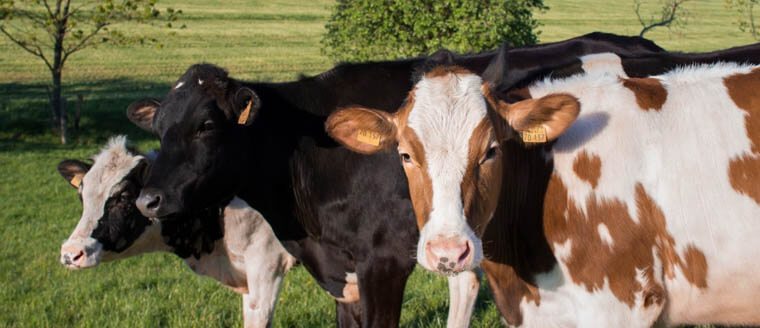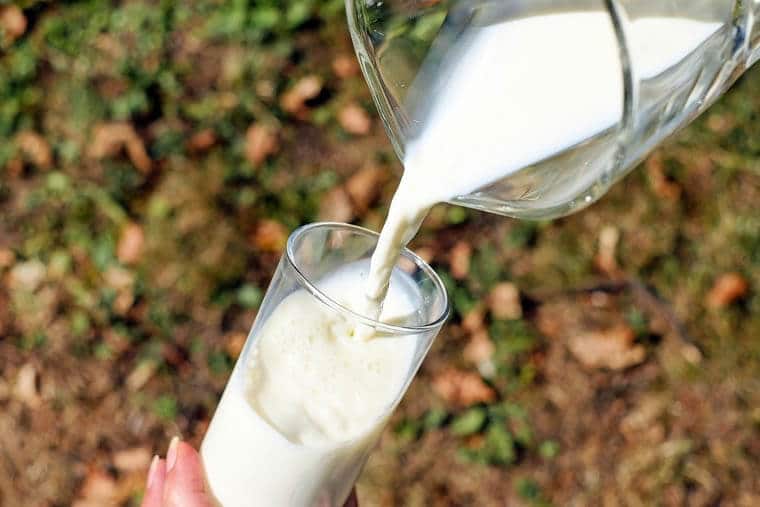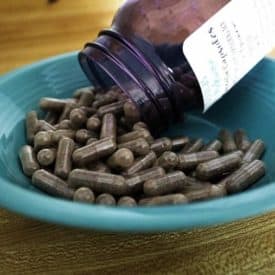In part 3 of Dairy Myths, we answer the question does milk cause heart disease. We dig into the truth about Dairy and Heart Health in this Dairy Myth Buster post.
We’ve been chatting about the health implications of dairy since it’s been talked about in the media so much lately. In Part 1, we discussed bone health, in Part 2, we went into the world of Weight Loss and now we’re moving onto answering the question, “Does Milk Cause Heart Disease?” Don’t forget to catch up on the other two posts (hyperlinked above) and meet me back here on the flip side.
Does High Fat Milk Cause Heart Disease?
Compared to monounsaturated fats and polyunsaturated fats, it’s common belief saturated fat and dietary cholesterol lead to increased blood cholesterol levels and an imbalanced ratio of elevated low-density lipoprotein (LDL) concentrations (often called the “bad cholesterol”) to high-density lipoprotein (HDL). This is one of the arguments when people try to answer the question, does high fat milk cause heart disease?
But new research suggests that saturated fat and dietary cholesterol is not as bad as we used to think. Sure, studies still do suggest that there are heart health benefits to replacing saturated fat with unsaturated fatty acids (particularly omega-3s), but the new studies are suggesting that replacing dairy (containing both saturated fats and cholesterol) with carbohydrates or other animal fats is not associated with a higher risk of heart disease. However, they do state that swapping dairy fat for unsaturated, vegetable sources of fat lower the risk of cardiovascular disease. So, does milk cause heart disease? Let’s take a closer look.
Dairy contains saturated, unsaturated fats (like omega 3s), conjugated linoleic acid (see PART 2 for more on that), minerals, antioxidants, and components that benefit your HDL cholesterol (the one that you WANT to have go up). Therefore, it has been proposed that other components of dairy fats besides saturated fats and trans fatty acids may actually be cardioprotective.
Saturated or otherwise, current research doesn’t support the claim that higher fat dairy products increase one’s risk of cardiovascular disease. In fact, there may actually be no real difference between reduced or regular fat dairy on heart health. In a recent study conducted on adolescents, the findings displayed very similar results between reduced and regular fat dairy on cardiometabolic health, with full fat showing inverse relationships with obesity in children. A large recent meta analysis also found dairy consumption and cheese, whether low or full fat, reduced stroke and coronoary heart disease risk. It should be taken into account though that additional data is necessary to determine dose-response patterns, or how much dairy we actually need to enhance our heart health. Truth is, there’s actually very few pieces of evidence that suggest higher risks of chronic diseases or mortality when consuming more regular fat dairy products.
The adolescent study compared results to adult studies, in which the majority found that dairy fat wasn’t linked to cardiovascular disease, hypertension or type 2 diabetes, although consuming reduced fat dairy was linked to a reduced risk of these diseases. The health-promoting effects of dairy shown in many studies also indicates that there may be a large difference between consuming whole foods compared to isolated nutrients. For example, dairy contains other essential nutrients (e.g calcium, protein, potassium, bioactive lactotripeptides) alongside the saturated fat, which will have varying health effects (either beneficial or harmful) compared to other high saturated-fat foods (like meat).
Additionally, there have been emerging studies on dairy fat composition, and how it contains certain, unique fatty acids that may offer some potential health benefits such as conjugated linoleic acids (CLA), butyric acid, palmitoleic acid (cis and trans), phytanic acid, and alpha-linolenic acid (ALA). A recent review looked at certain circulating fatty acids from dairy intake particularly margaric and myristic acid. They found that fatty acids in dairy products don’t have a negative effect on heart health. Based on these studies, it’s proposed that dairy fat is unlikely to increase the risk of obesity or cardiometabolic disease, and may even be a valuable part of our diets.
So then, does Milk Cause Heart Disease?
Dairy contains a variety of different unique components, giving rise to exciting research as a functional food beyond its nutritional properties. Contrary to what was previously believed, dairy (even higher fat dairy) is not likely harmful to heart health and it doesn’t look to be that full fat milk causes heart disease. In fact, milk may potentially be beneficial for those who can tolerate it (more on this later.).
Don’t forget to check out Part 1 and Part 2 of this debate to get some background information on where we were going to answer the question Does Milk Cause Heart Disease? Check out Part 4, 5 & 6 where we cover milk and diseases as well as milk controversy, safety and alternatives!
What are your thoughts on Dairy and heart health?
What is your thought or response to the question” Does full fat milk cause heart disease?”
What do you drink at home?
Do you avoid dairy?
Leave me a comment below- I would love to hear your thoughts!
Contribution By:
RD2B Rachel Shims
Updated on September 1st, 2022

Abbey Sharp is a Registered Dietitian (RD), regulated by the Ontario College of Dietitians. She is a mom, YouTuber, Blogger, award winning cookbook author, media coach specializing in food and nutrition influencers, and a frequent contributor to national publications like Healthline and on national broadcast TV shows.







Susan says
Nice resource thanks for sharing abbey!
Abbey Sharp says
Thanks Susan!
Kerri McGrail says
i dont consume dairy (vegan ;)), but i do think limiting animal products is very important for lowering heart disease as cholesterol from animal products is the main contributor to heart disease. i think there is a lot of misinformation out there and i always encourage people to read scientific literature or complete a degree in the medical/scientific field to gain more information. i think we will have to agree to disagree on this one lol. Thanks for sharing this though- it is always interesting to read things from someone who has different views.
Esther says
Great info! I am not big on milk itself, never really liked the taste, but other full fat dairy products I have in my diet 🙂
Angela @marathonsandmotivation.com says
I have read this as well. we switched to full fat dairy 2 years ago. my kids are not big milk drinkers, but when they do, it is whole milk.
Abbey Sharp says
It tastes better too
Rebecca | NOURISHED. says
Love this (and such a great series too!) Cheese is definitely my favourite milk product – any and all kinds!
Abbey Sharp says
agreed girl
dixya @food, pleasure, and health says
this is such a comprehensive post, sharing on my fb 🙂
Abbey Sharp says
thanks love!!
jill conyers says
You’re such a great nutrition resource Abbey! except for the occasional plain greek yogurt i avoid dairy. my tummy is happier that way.
Abbey Sharp says
yes, you gotta do what makes the gut happy 🙂
Sarah says
Wow I’ve never Heard this before. I like my dairy products but my tummy doesn’t.
Abbey Sharp says
i hear ya girl
Ilka says
These are interesting findings. I personally do better with less dairy in my diet, but my kids enjoy organic grass-fed milk products!
Abbey Sharp says
that’s great!
Kerri Olkjer says
We totally do full fat dairy. We’re paleo, but do high quality, grass-fed, full-fat dairy.
Abbey Sharp says
love it kerri!!